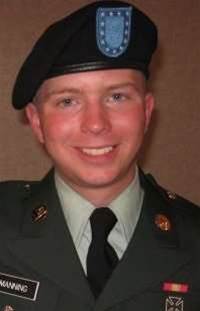Forensic computer experts have traced break-ins to a secret US government website to Bradley Manning, the American soldier charged with the biggest leak of classified files in US history.

Manning, 25, is accused of providing more than 700,000 secret files to anti-secrecy website WikiLeaks while serving in Iraq in 2009 and 2010.
He is accused of 21 charges, including aiding the enemy, and could face life in prison without parole if convicted in the case.
The trial was gathering pace as officials search for more details about an ex-CIA employee who leaked details of a top secret US surveillance program in which security services monitored data about Americans' phone calls and internet usage.
Manning, who was arrested in May 2010, is charged with downloading intelligence documents, diplomatic cables and combat videos and forwarding them to WikiLeaks.
Government witnesses told the court-martial they had traced breaches of the US government's secret Intelink intelligence database to Manning's user name and IP address. The testimony was presented as prosecutors seek to prove that Manning orchestrated the release of documents, including secret diplomatic cables.
Manning was a low-level intelligence analyst when he allegedly released the documents to WikiLeaks, a move he said was intended to provoke a more robust debate in the United States on the military and foreign policy. US officials said the breach put lives at risk.
In written testimony, National Security Agency contractor Steven Buchanan said computer audit logs showed secret Intelink information was successfully accessed by Manning in 2009 and 2010.
David Shaver, another computer expert, also testified that large amounts of classified information were downloaded from Intelink and traced to Manning's computer.
Defense attorney David Coombs sought to cast doubt on whether all the unauthorised computer use attributed to Manning could have been done by him. Some of the more than 800 internet searches from Manning's computer could have resulted from malfunctioning equipment, or activity by other persons, he said.
"You don't know who did those searches," Coombs said.
Military computer crimes investigator Mark Mander said he found chat logs that show when internet users post information. His review showed a large amount of classified US military information was transferred without authorisation.
"It appeared that the organisation WikiLeaks was the recipient of the information," said Mander. .
One January 2010 Twitter message anonymously offered secret US military information to WikiLeaks, Mander said. A later WikiLeaks tweet requested US military information.
Asked by Coombs if he had found any evidence that Manning personally viewed the Tweets, Mander said: "I did not."





_(20).jpg&h=140&w=231&c=1&s=0)





 iTnews Benchmark Awards 2026
iTnews Benchmark Awards 2026
 iTnews Executive Retreat - Security Leaders Edition
iTnews Executive Retreat - Security Leaders Edition
 iTnews Cloud Covered Breakfast Summit
iTnews Cloud Covered Breakfast Summit
 The 2026 iAwards
The 2026 iAwards












_(1).jpg&h=140&w=231&c=1&s=0)



